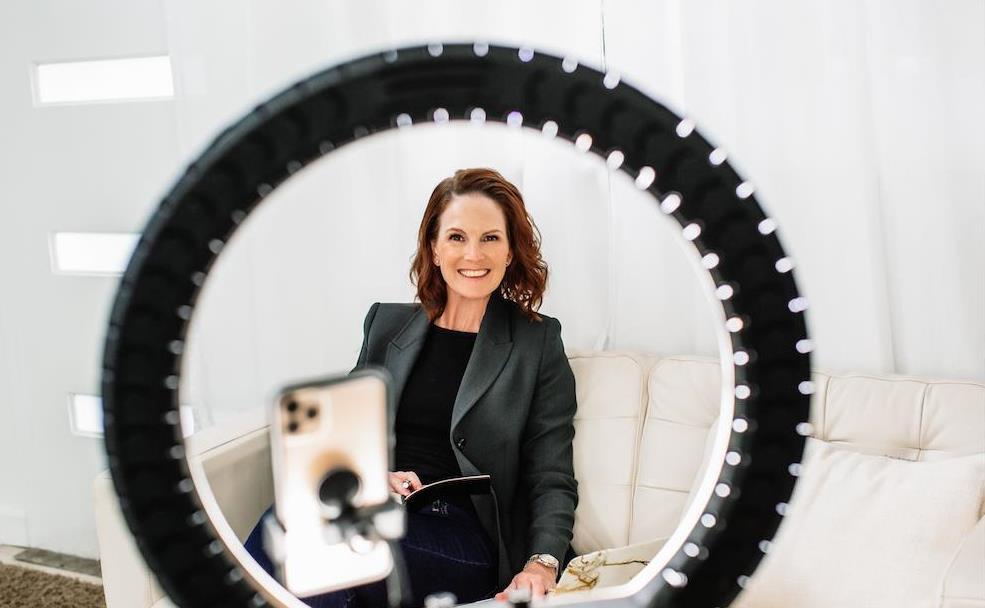Maybe you’re in your late 30s or 40s or beyond. Skilled and experienced, your progress seems to have stalled. You’re no longer the fresh new talent and you’re fading into the background. Added to that, you’re stretched too thin over multiple commitments; your professional identity is getting fuzzy.
Welcome to the Big Blah, especially if you’re a woman.
‘Something happens around mid-career that I believe is a bit of a crisis point,’ says Karen Eck, an experienced entertainment publicist, strategist and talent manager who’s worked with people and brands you’re bound to have heard of. In 1999 she founded The eckfactor, an Australian publicity agency whose motto is ‘We make extraordinary happen’. That kind of bubbly enthusiasm and overstatement is par for the course in the PR industry, but Eck backs it up with practical nous and compassionate wisdom.
‘People need support, and a little bit of time to think about what it is they’re saying to the world,’ she says, ‘and they need to be empowered to actually promote themselves.’
‘People need support, and a little bit of time to think about what it is they’re saying to the world,’ she says, ‘and they need to be empowered to actually promote themselves.’
Karen Eck
Enter ‘The Power of Visibility’, a series of online masterclasses that Eck first developed to help mid-career women in the Australian screen industry. Alumni include directors Samantha Lang and Sonia Bible and DOP Carolyn Constantine ACS. So even the most accomplished women can need help to think about promoting their talents and building their careers.
Born from Dame Changer
The idea was born when Eck attended a film screening in Sydney and got talking to Heather Oxenham, the co-founder of Dame Changer. Dame Changer is a professional women’s collective providing opportunities in training and networking, and breaking down the barriers experienced by mid-career women in the Australian screen industry. A member-based not-for-profit organisation, it has Margaret Pomeranz AM as patron, an advisory board including Anni Browning, Jane Corden, Amanda Dobbie and Neralda Jacobs; and is sung by the likes of Caitlin Yeo, Gillian Armstrong and Rachel Ward.
Read: Three killer mistakes women make in promoting their work
‘Heather said their research with their Dame Changer members indicated that many of them were still uncomfortable promoting themselves,’ remembers Eck. ‘So she asked me to come in and do a workshop to help from a branding perspective and give them some ideas. I was happy to share my two bob’s worth and see if it resonated, and it absolutely resonated!’
Since that first two by two-hour Zoom masterclass, conducted on subsequent Saturday afternoons, Eck has conducted two more masterclasses for Dame Changer members, all held online, and limited to 10 participants for intimacy and interaction. She’s also adapted the program, conducting bespoke versions for about 100 other women in industries ranging from banking and finance to law, engineering and fashion.
Eck says the basic problem remains the same across industries: a lack of confidence holds us back. Most of us hate putting ourselves out there, yet we all need to learn how to self-promote in ways that fit our own messages and our individual styles.
What holds us back?
Eck says the anecdotal feedback from women in all industries is very similar when it comes to the barriers and opportunities around raising career profiles. She calls it ‘the Barrier Quadrant’.
- Lack of Confidence
- Lack of Know-how
- Personality Paralysis
- Feeling Overwhelmed
Lacking Confidence and fear of ego
A lack of confidence is a continuing problem for women in many industries, but especially screen. As Dame Changer’s Heather Oxenham told us in an email, ‘Women are more prone to being humble or dismissive about their achievements. Our screen industry women are exasperated at how hard it has been to get ahead as a woman in a male dominated industry… Only a handful of women break through and the statistics in our industry are terrible and it is a global phenomenon in the screen industry. Less that 5% end up directors and less than 30% producers ….’
Building confidence is not going to solve structural gender bias, but it’s certainly a key factor in challenging it and in feeling empowered to blow your own trumpet.
Eck acknowledges that for many people, thinking about themselves as a ‘brand’ is uncomfortable if not downright distasteful. ‘But branding is a fact, and people need to look at why they do what they do, and what they’re trying to do with their platform or their voice,’ she says.
Read: Give female DPs a go: Carolyn Constantine ACS
‘So if you’re a filmmaker, if you’re in the business of creating incredible content, and you want to find an audience, then it is fundamentally looking at why you want to create that content, what’s driving you for that, and what’s the message you want people to understand.’
‘What I like to look at is, bearing in mind who you are, how you like to work, and the sort of personality that you have, what are the sorts of things that you can do to tell your story. And if your story is the work that you’re doing, the project that you’re doing, the finance you’re trying to attract, then you need to think about how you can best reach those audiences? And do it in a way that feels comfortable with you.’
I’m too shy…
What exactly is Personality Paralysis? Eck says it comes from identifying ourselves as shy or introverted and thinking we couldn’t possibly self-promote. Fifty per cent of people in the world would consider themselves to be introverts but they just need to understand that they can still communicate and do things in a way that makes them feel more comfortable,’ she says.
‘It could be using certain platforms, or potentially using a tone of voice that makes them feel comfortable. It’s not about being “jazz hands” at all, and when I say that I find I get the cut-throughs, where people go, “Ah, okay, so I can do this. I don’t need to be that person dancing across the stage.”‘
‘Social media is a way that introverts can connect, particularly if their purpose is front and centre, which makes them feel more comfortable.’
‘For example, if someone’s a really great writer, and certainly within the screen industry, there are so many, they could pen an opinion piece on an issue that is central to their work. That piece of writing becomes content they can use in a variety of ways, whether it’s sharing it across LinkedIn, on their website, or distributing it to community groups.’
We have entered the age of vulnerability on social media, observes Eck, and this can be a boon for introverts. ‘Contrary to what you may think, I come across a lot of shy people who are more comfortable being themselves on social media than networking in a room. And sharing personal information these days on social platforms is more accepted than it was even a few years ago. This is a way that introverts can connect, particularly if their purpose is front and centre, which makes them feel more comfortable.’
Feeling overwhelmed and doing nothing
Eck says this is a real problem especially for those who suffer from anxiety. She gives the example of one of her participants. ‘She’s super smart, a journalist, a great writer. And she knows what she wants to do, but she feels overwhelmed and that leads to an anxiousness. And so she does nothing because it’s all too hard. What I would encourage is to step back and actually create a little bit of a plan. And in the class we definitely create a plan that she needs to then follow, step by step.’
Read: How to Hustle: tips and tricks for networking in the screen industry
‘There’s that great saying: If you have to eat an elephant, you eat it one teaspoon at a time. You need to give yourself a plan and some time to focus.’
‘Number two: don’t create too much expectation on having to deliver everything at once in a super fast time. Be realistic and check in with yourself as you’re working towards that.’
Eck’s Quick Tips for Increasing your visibility
- Get your media assets ready. This means good headshots as well as some photos of you at work. ‘Remember it’s easier to take the photos as things happen than trying to recreate them.’
- Be camera-ready and put yourself in the picture. She gives the example of a director on the red carpet, organising a photographer to take cast and crew shots, including herself.
- Don’t worry so much about how you’re going to be perceived or judged.
- Practise and memorise key pieces of information so you’re confident to deliver them and riff on them depending on audience. This doesn’t make you fake, it helps you be spontaneous.
- Remember why you’re promoting yourself – for the good of your story, your cause, your project and your team.
- Give yourself time to focus on your own brand.
- Acknowledge that there is aways a positive way forward. This is a productive first step.
- You need to START and not look back!
A little story
Writer and director Sonia Bible participated in Eck’s workshop after feeling frustrated and struggling for many years to independently finance her documentary about artist Rosaleen Norton, The Witch of Kings Cross. Eck contacted me at Screenhub to suggest we might like to interview Bible, whose sexy, stylish film about a trailblazing female artist was doing well at festivals and looking at a release later in the year. We wrote this story an hour after it was published, Bible was contacted by a production company looking to work more with female directors like her. Visibility works.
Incidentally, Eck also told Bible to get some good red carpet photos of herself at the premiere with key talent, and those images went around the world. ‘Sometimes people just need permission to put themselves in the picture,’ she says.
The Power of Visibility Masterclass for Dame Changer members will run 12 & 19 June at 2pm. Limited places available. Book at the link. You can join Dame Changer at www.damechanger.com





